Key takeaways:
- VPNs enhance online privacy by encrypting data and masking IP addresses, providing users with a sense of security, especially on public networks.
- Choosing a reputable VPN provider is crucial; look for services with a strict no-logs policy, good speed, and accessible customer support.
- Using a VPN allows for unrestricted access to geo-blocked content, empowering users to enjoy a broader internet experience.
- Effective VPN usage includes selecting reliable services, regularly switching servers to avoid congestion, and activating VPNs before using public Wi-Fi to ensure data protection.
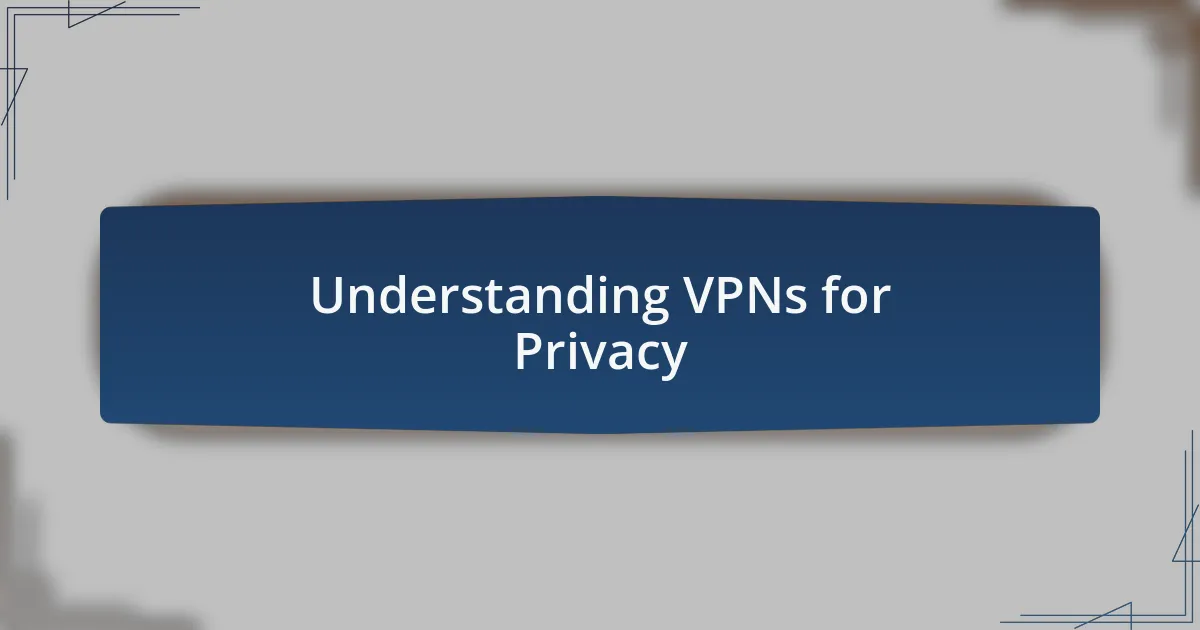
Understanding VPNs for Privacy
Using a Virtual Private Network (VPN) can feel like creating a digital fortress around your online presence. I remember the first time I used a VPN; it was eye-opening to see how easily I could mask my IP address and encrypt my data. This simple step provided me with a heightened sense of security, especially when connecting to public Wi-Fi networks. Have you ever thought about how exposed we are when browsing without protection?
On a more personal note, I often reflect on the privacy concerns that come with everyday browsing. One incident that stands out is when I realized my online shopping habits were being tracked, leading to targeted ads that felt invasive. Using a VPN allowed me to regain control over my online footprint. Doesn’t the idea of reclaiming your digital privacy sound empowering?
Understanding how a VPN works for privacy goes beyond just hiding your location; it’s about safeguarding your personal information. With each connection, I feel more confident knowing that my online conversations and transactions remain private. If you’re like me, concerned about online security, isn’t it comforting to know that there are tools available that prioritize your privacy?
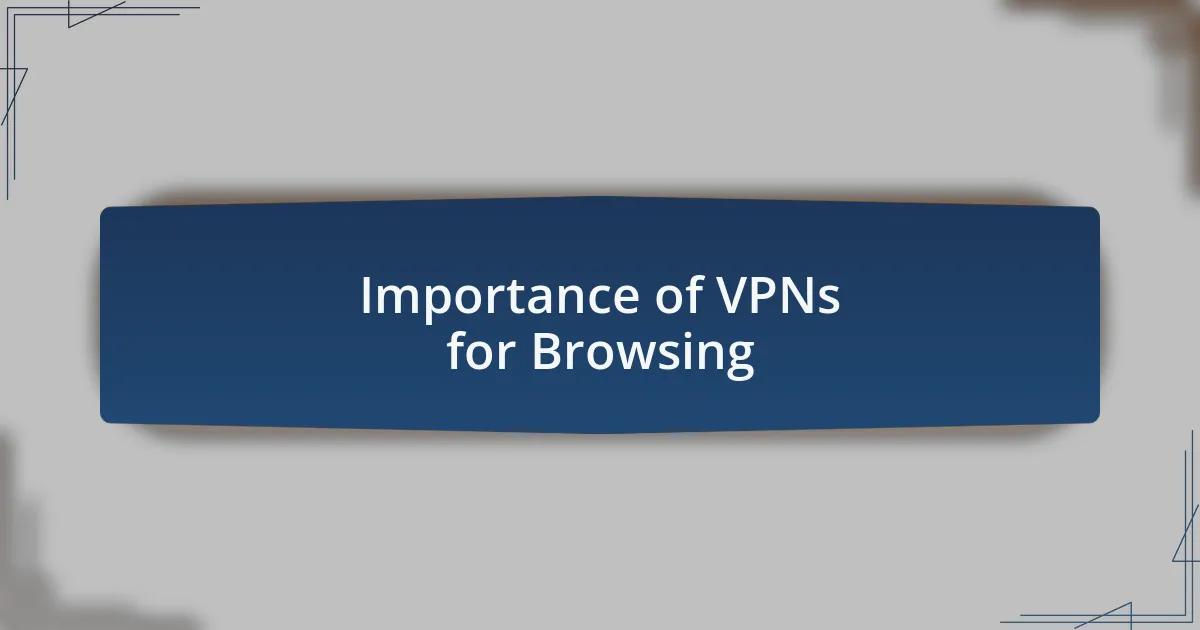
Importance of VPNs for Browsing
The importance of VPNs for browsing can’t be overstated. I remember a time I was traveling and needed to access my bank account. That moment of anxiety when I connected to an unfamiliar network made me realize how vulnerable I was. With a VPN, I could browse without fear, knowing my information was secure and encrypted.
Beyond security, VPNs enhance privacy in ways we often overlook. It’s alarming how much data companies collect about our browsing habits. I used to feel uneasy about real-time tracking by advertisers, but using a VPN has helped me reclaim a sense of anonymity. Isn’t it liberating to think that your online activities are truly your own and not fodder for marketing agendas?
Moreover, VPNs can open the door to a more diverse internet experience. I’ve often found myself in regions where specific content was blocked. Once I turned on my VPN, not only was I able to access what I wanted, but I also felt empowered by the options available. Hasn’t it crossed your mind that accessing a wider range of information is part of a free internet?
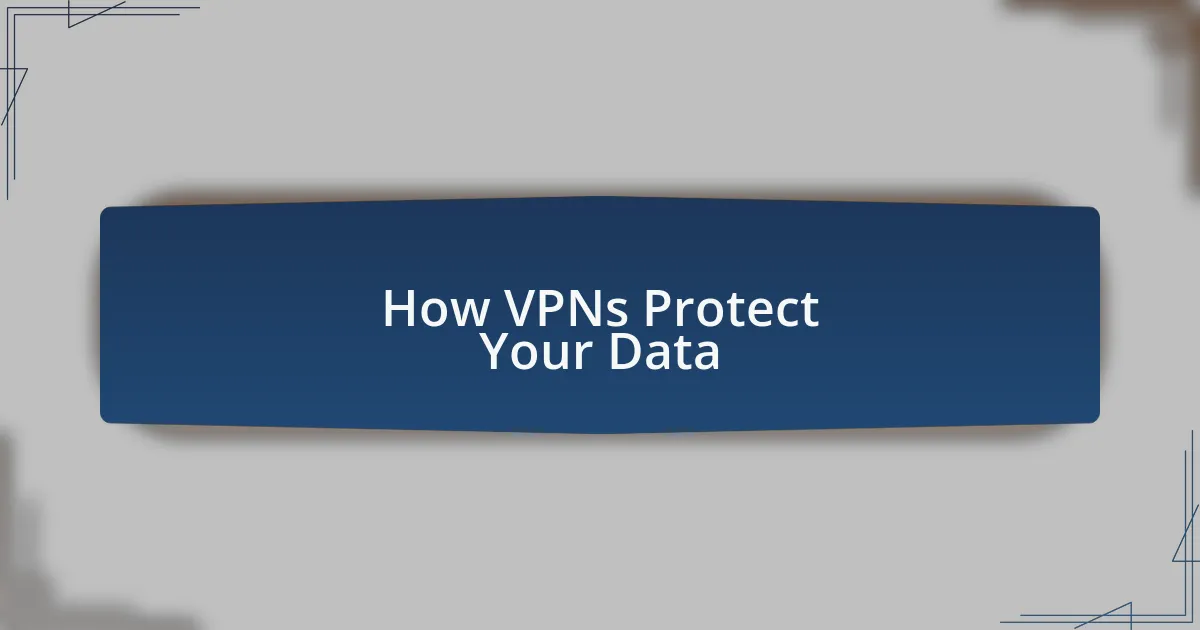
How VPNs Protect Your Data
When you connect to a VPN, your internet traffic is routed through a secure server, creating an encrypted tunnel for your data. I still remember the first time I learned about encryption. It felt like discovering a secret code that only I could understand. Knowing that my sensitive information, like passwords or credit card numbers, is scrambled and virtually useless to anyone who might intercept it? It’s a reassuring thought.
Additionally, VPNs mask your IP address, making it seem like you’re accessing the internet from a different location. I once noticed that my online searches led to vastly different results when I changed my virtual location. It clicked that not only was I gaining privacy, but I was also sidestepping potential surveillance. Have you ever thought about how much more control we could wield over our digital footprints by simply changing our virtual address?
Moreover, when using public Wi-Fi, the risk of data breaches skyrockets. I vividly recall trying to connect to a café’s Wi-Fi and feeling that familiar twinge of discomfort. That’s when I realized how essential my VPN was. It became my shield, insulating me from prying eyes in crowded spaces. Isn’t it interesting how a simple tool can transform a potentially risky situation into a safe browsing experience?
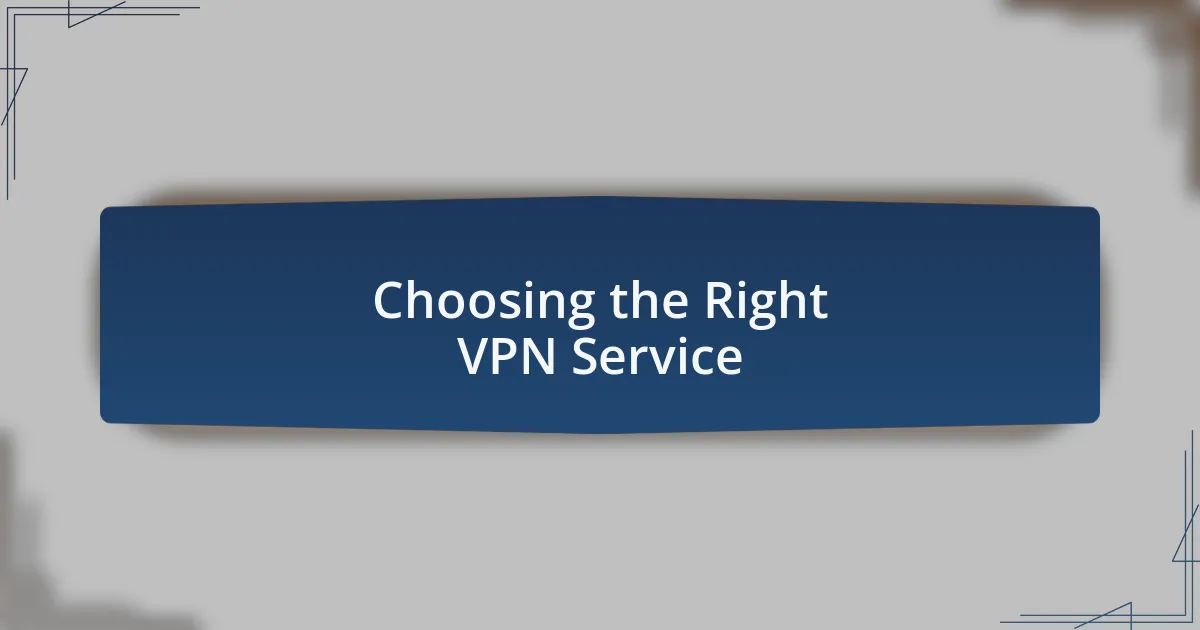
Choosing the Right VPN Service
When it comes to choosing the right VPN service, the first thing I consider is the level of privacy and security it offers. I once fell into the trap of opting for the cheapest option, only to realize later that hidden logs were being kept. That experience served as a wake-up call, reminding me how crucial it is to select a VPN provider with a strict no-logs policy. After all, if they’re keeping records of your activity, what’s the point of using a VPN in the first place?
Another important factor is the speed and reliability of the connection. I fondly remember a night spent binge-watching a series, only to be met with buffering issues from my VPN. It made me reconsider my choice and ultimately led me to prioritize services that offer fast servers and reliable connections. Have you ever found yourself stuck waiting for a video to load? It can be a frustrating experience, especially when all you want is seamless browsing.
Lastly, I pay attention to customer support. I once found myself struggling to configure my VPN on a new device and felt a wave of panic wash over me. Thankfully, the support team was responsive and helped me through the process. This experience highlighted the importance of having accessible help when things don’t go as planned. A reputable VPN should offer easy-to-reach customer service, so you never feel alone on your privacy journey.
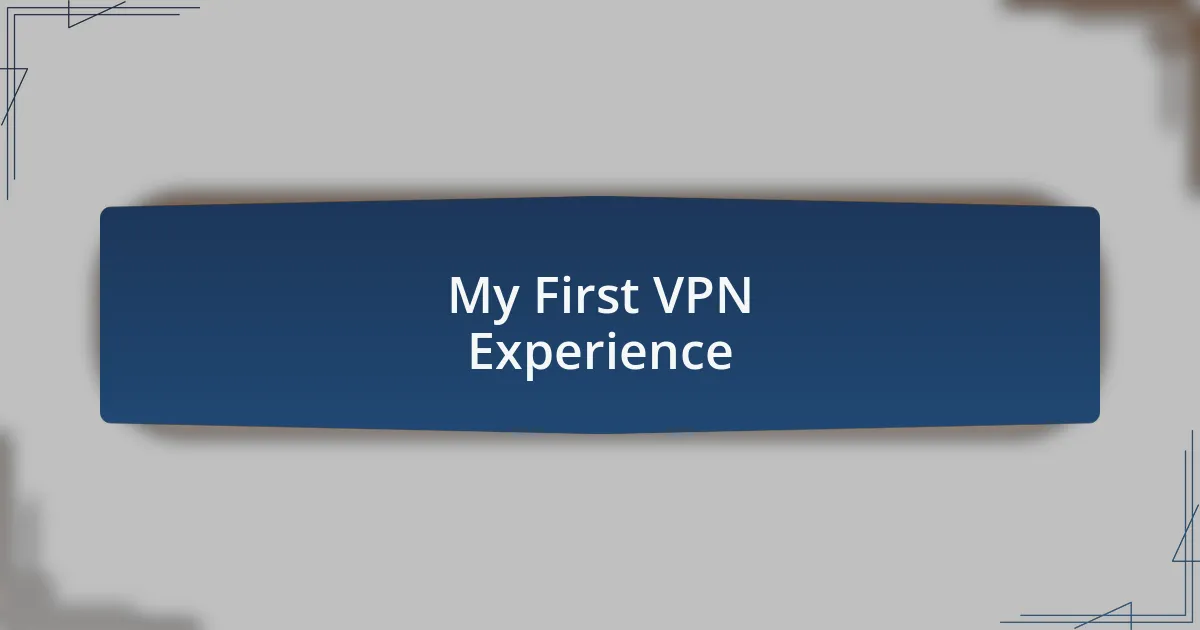
My First VPN Experience
My first experience with a VPN was a bit of an adventure. I remember the thrill of setting it up on my laptop, thinking I was about to unlock a whole new level of online privacy. However, when I tried accessing my favorite streaming site, I found myself confused. It felt like hitting a wall; I had expected seamless access, but instead, I faced error messages that made me question if I had made a mistake in my choice.
There was this moment of panic when my connection dropped unexpectedly during an important work call. I vividly recall the sinking feeling in my stomach as I struggled to reconnect, fearing my privacy was at risk. Luckily, I had chosen a reputable VPN service with a solid track record, and as I got back online, I understood the importance of reliability in a VPN. Have you ever felt that sense of dread when technology doesn’t cooperate?
As I navigated through websites with my new VPN, I discovered an unexpected joy in the freedom it offered. I started to really appreciate the enhanced security it provided. It was an empowering feeling to know that my data was shielded from prying eyes, especially in a world where privacy often seems like a distant dream. Reflecting on that experience, I realize how crucial it is to feel secure while browsing, and that sense of liberation was worth all the initial confusion.
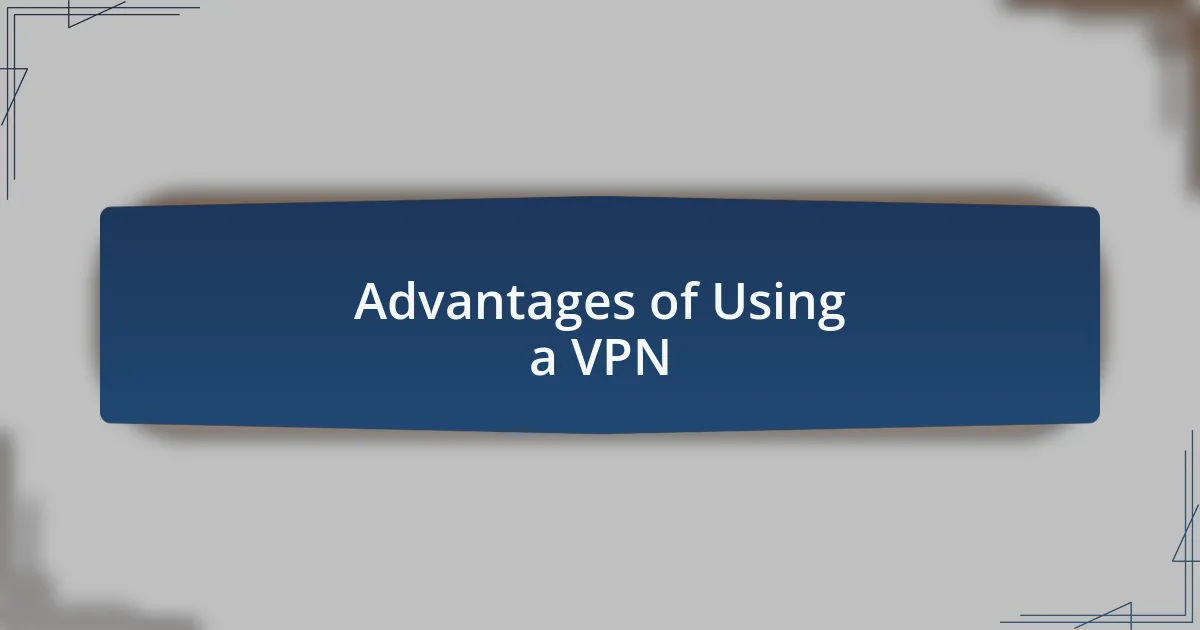
Advantages of Using a VPN
One significant advantage of using a VPN is the strong layer of encryption it provides. I still remember the relief I felt when I realized my online activities were cloaked from hackers and snoopers. It’s like having a digital invisibility cloak—why wouldn’t anyone want that level of security? Knowing that my sensitive information was protected gave me the confidence to shop online without the constant worry of credit card fraud.
I also found that a VPN allows for unrestricted access to content. There was a time when I wanted to enjoy shows that were only available in other countries. With the simple switch of a server location, I could suddenly binge-watch without a hitch. It’s amazing how a VPN can transform your browsing experience from limited to limitless, opening up a world of entertainment at your fingertips. Isn’t it fascinating how technology can break down international barriers?
Lastly, using a VPN can enhance your privacy by masking your IP address. I’ve found it incredibly comforting to browse without leaving a trail behind me. There’s something reassuring about knowing that my online behavior isn’t being tracked by advertisers. It makes you question—how much does our data matter? For me, every bit of privacy feels like a small victory in reclaiming control over my online presence.
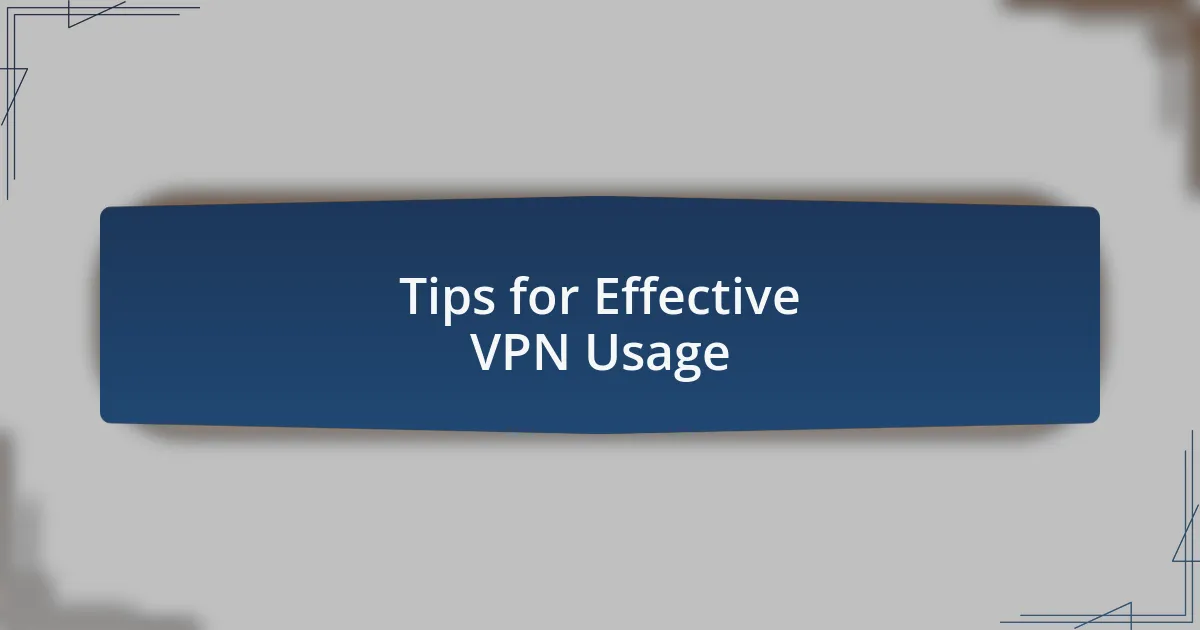
Tips for Effective VPN Usage
When using a VPN, always choose a reputable provider. I remember the first time I tried a VPN and went with a free option—what a mistake! Not only was the connection slow, but at one point, I even had ads pop up that felt invasive. It taught me that investing in a reliable service is worth every penny for peace of mind and seamless browsing.
Another tip is to regularly switch servers. I learned this the hard way during an important video call when my connection dropped due to high traffic on the server I had been using. By changing servers, I noticed significantly improved speeds and fewer disruptions. It’s like finding a quiet café versus a crowded one—sometimes the right environment makes all the difference.
Lastly, don’t forget to activate your VPN before connecting to public Wi-Fi. One time, I settled down at a coffee shop, and the thought of connecting without my VPN gave me pause. The potential risks of exposing my data in a public space were daunting. By having the VPN active, I could enjoy my latte while feeling secure that my personal information was protected. After all, isn’t our online safety worth being a bit proactive?